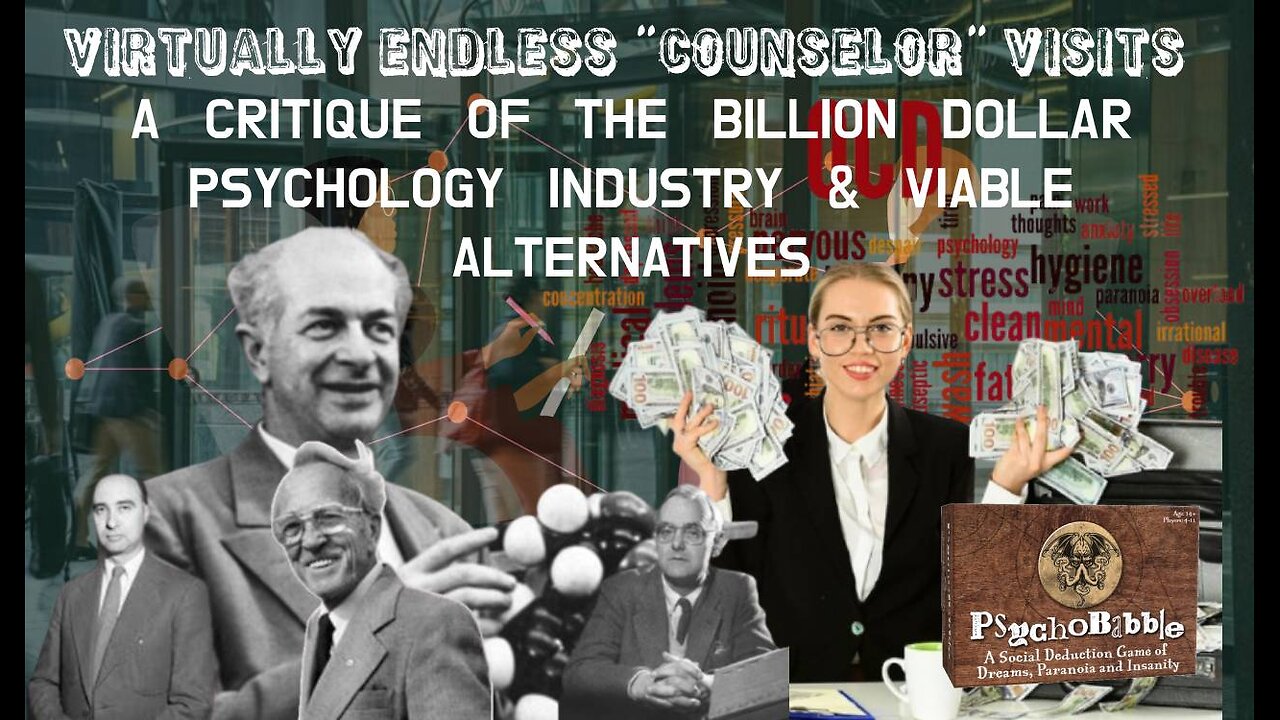Premium Only Content

Confused By Endless Counselor Psychobabble? A Critique Of Psychology & Psychiatric Industry
Disclaimer: This video serves as an analysis of the reductionist approach to the "healthcare" system, which we believe is more accurately described as "sick care," primarily focused on managing symptoms. We assert that the images, video content, and critical commentary featured are utilized under the principle of "fair use," with no intention to harm anyone's reputation. Our goal is to provide constructive criticism aimed at humanitarian objectives and to foster education. If you have any concerns regarding this video or related content, we encourage you to reach out to us directly.
Are you stuck in a troubled marriage or relationship? Many individuals find themselves trapped in seemingly endless and unproductive counseling sessions. What makes these sessions ineffective? The success rates of counseling can be disappointing for various reasons, such as issues in the therapist-client relationship, a lack of personalized treatment plans, inconsistent attendance, and problems within the therapist-client dynamic. However, the most significant reason is that these sessions often fail to examine the body in a holistic manner, much like a botanist studies a plant.
Simply visiting a psychologist or counselor can feel akin to seeing a family doctor who refers you to numerous specialists, none of whom communicate effectively with one another. This approach is known as "reductionism," which involves breaking down the human body and its conditions into isolated parts and processes, primarily for the sake of managing symptoms. This represents the flawed "conveyor belt" system misleadingly labeled as "health care," when a more accurate term would be "sick care."
Many people view this fragmentation of human processes as "quackery," along with the seemingly endless visits to psychologists and counselors. The assertion that "most psychology is psychobabble" is an exaggerated generalization. While "psychobabble" does refer to the misuse of psychological terminology and jargon, it does not encompass the entire field. Psychology includes a wide range of research areas and therapeutic methods, and not all of it can be dismissed as trivial or overly complicated.
The marriage, relationship, and psychotherapy sectors are currently experiencing transformative changes. There is a notable shift in the psychotherapy and relationship domains, with an increasing focus on mutual respect and the therapeutic alliance. This evolution signifies a departure from conventional power structures, promoting a collaborative environment where therapists and clients engage as equal partners in the therapeutic journey. Furthermore, there is a rising interest in blending diverse theoretical frameworks and broadening mental health care to encompass preventive and holistic strategies, rather than solely concentrating on diagnosing and treating disorders.
However, many professionals, like those featured in the video you have seen or will see, continue to adhere to the outdated "traditional power dynamic," often resorting to repetitive, reductionist scientific definitions. These definitions frequently rely on the Diagnostic Statistical Manual and other psychological and psychiatric training, lacking a comprehensive systems science perspective or a holistic understanding of the underlying reasons our bodies and minds exhibit so-called "syndromes," including various personality disorders.
Nutritional psychology is a multidisciplinary area that investigates the connection between diet and mental health. It looks into how our food choices and nutritional levels affect psychological aspects such as mood, behavior, and cognitive abilities. Furthermore, it studies how psychological elements like stress, emotions, and mental conditions can shape our eating habits.
The roots of "nutritional psychology" can be traced back to orthomolecular psychiatry, which emphasizes the use of nutrients in treating mental health issues. This field has underscored the significance of nutrition in relation to mental health and behavior. While orthomolecular psychiatry focuses on biochemical imbalances and nutrient shortages as fundamental causes, nutritional psychology takes a broader view, examining the complex interactions among psychological, behavioral, and nutritional elements that contribute to mental wellness.
The term orthomolecular nutrition was introduced by Linus Pauling in 1968, highlighting the necessity of having "the right molecules in the right amounts" for optimal health. Although previous studies had looked into vitamins and their potential therapeutic effects, Pauling's research established the notion that specific nutrients could be utilized to address diseases by rectifying molecular imbalances. This idea gained momentum in the 1970s with the establishment of the Institute of Orthomolecular Medicine, which was later renamed the Linus Pauling Institute of Science and Medicine.
-
 LIVE
LIVE
StoneMountain64
5 hours agoArc Raiders EXPEDITION Money Making is Insane
88 watching -

Redacted News
2 hours agoTotal War! Trump Prepares MASSIVE Attack on Venezuela, Tells Maduro "Get Out Now" | Redacted News
108K95 -
 LIVE
LIVE
GritsGG
5 hours ago#1 Most Warzone Wins 4120+!
101 watching -
 1:14:43
1:14:43
Russell Brand
4 hours agoThe Unraveling: Cracks From Washington to Westminster - SF657
98.1K27 -
 1:09:15
1:09:15
vivafrei
4 hours agoTim Walz is a Loser and a FRAUD! Never Give Up Your Guns! Jan. 6 Pipe Bomber BREAKING NEWS & MORE!
43.3K28 -
 1:13:30
1:13:30
Sean Unpaved
2 hours agoCaleb Williams & Bears Jump To #1 In NFC! | UNPAVED
2.55K -
 9:48
9:48
Buddy Brown
7 hours ago $0.74 earnedOne of the RISKIEST Videos I've Done | Buddy Brown
5.04K7 -
 LIVE
LIVE
LFA TV
23 hours agoLIVE & BREAKING NEWS! | MONDAY 12/01/25
1,074 watching -

John Crump Live
3 hours agoThe Return Of John Crump Live
5.39K1 -
 22:49
22:49
The Quartering
2 hours agoBlack Friday Debt Bonanza, Youtube Bans Millions, South Park Roasts Bill Burr, MrBeast Outs Youtube
15.3K3